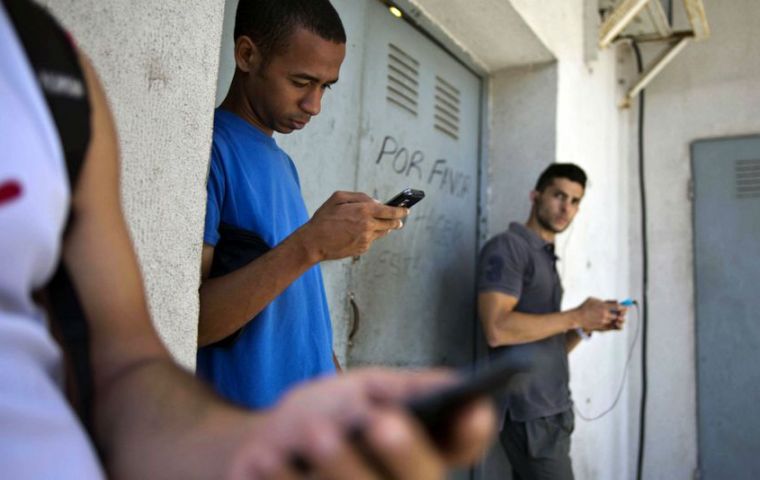MercoPress. South Atlantic News Agency
Cubans complain about Internet service, too expensive, too slow and censorship
 Mobile packages run from US$7 for 600 megabytes to US$30 for 4 gigabytes. Those prices put it of reach for the vast majority of Cubans
Mobile packages run from US$7 for 600 megabytes to US$30 for 4 gigabytes. Those prices put it of reach for the vast majority of Cubans Six months on from the euphoria that greeted full internet access for mobile phones on the communist-run island, frustrated Cubans complain it is too expensive, too slow and crippled by government censorship.
Hundreds have joined a Twitter campaign to call for affordable rates.
“We are hungry, hungry for information, hungry for online surfing, hungry for knowledge and intellectual freedom,” summed up one user.
“It's not possible that the internet is a luxury in the 21st Century,” said another campaigner using the hashtag #BajenLosPreciosDeInternet - “drop internet prices” in Spanish.
Another accused state-owned telecommunications company Etecsa of spying on the population. Etecsa “is spying on us and censoring us with full impunity.”
“Cubans' purchasing power is one of the lowest in the American continent, so is the minimum wage and access to the internet is not among the cheapest,” said Mr Norges Rodriguez, who runs a technology blog, Yucabyte.org.
Mobile packages run from US$7 for 600 megabytes to US$30 for 4 gigabytes. Those prices put it of reach for the vast majority of Cubans who subsist on a wage of around US$30 a month paid by public sector jobs.
Uptake is poor for home internet. Only 79,000 homes have signed up to the service, - out of a population of 11.2 million.
“If you want to connect to the internet at home 24 hours a day, seven days a week, you have to pay the equivalent of US$800 a month.
”There is no flat rate on that service, as you have in the rest of the world,“ said Mr Rodriguez. He added that the Havana government also banned any news sites critical of the government. ”The government has blocked all media websites with content they dislike.”
The ongoing US embargo means sites like Google, Apple and Amazon cannot be accessed from Cuban IP addresses, said Mr Rodriquez.
The government recently greenlighted the importation of routers to allow private wifi networks, albeit using state-monopoly Etecsa servers. Critics say the dollar-an-hour cost makes it too expensive.
Before the roll-out of 3G technology in December - opening up the online world to the country's 5.3 million smartphone users - the internet was available to the general public only via wifi hotspots, payable by the hour.




Top Comments
Disclaimer & comment rulesCommenting for this story is now closed.
If you have a Facebook account, become a fan and comment on our Facebook Page!